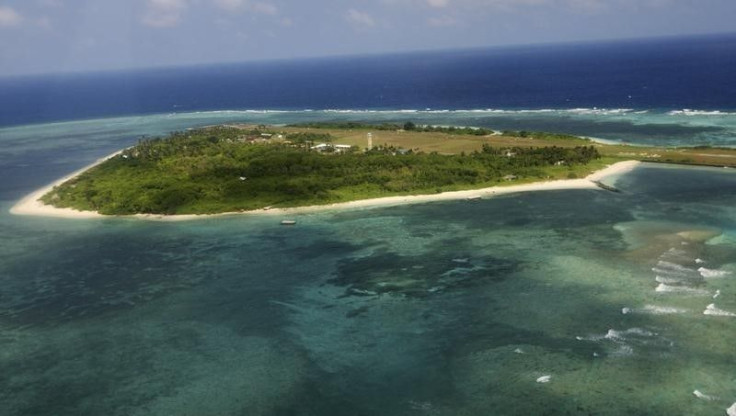Challenging China: Philippines Plans Military Infrastructure On Disputed Pag-Asa Island
KEY POINTS
- Pag-Asa is part of the disputed Spratly Island chain
- The new infrastructure includes naval beaching ramp
- Manila says the new infrastructure will make the island more livable
Philippine Defense Secretary Delfin Lorenzana visited the Philippine-occupied island of Pag-Asa on Tuesday (June 10) and announced plans for the buildup of military infrastructure that will include a naval beaching ramp. A fisherman’s shelter is scheduled to open on the country’s 122nd Independence Day on Friday.
The military aspects of the project will likely raise some eyebrows in Beijing. Pag-Asa is part of the disputed Spratly Island chain and has been occupied and controlled by the Philippines since 1968.
It technically lies outside the Philippines exclusive economic zone, or EEZ, and is near where Chinese fishing vessels and coast guard ships have been known to gather. There is speculation that the island could become a flashpoint between the two countries.
Lorenzana brushed aside the military implications of the new infrastructure, claiming instead that it was designed to make the island more livable without militarizing it. He expressed confidence that the new construction would not lead to conflict.
He said, “The Chinese have said they will not attack us. So, we are safe here [and] the purpose is to develop a safe, viable community. We will not militarize this, like [with] cannons, missiles."
One peaceful purpose of the new beaching ramp, according to Lorenzana, would enable the navy to bring in supplies even during typhoon season. He said, “Before this ramp, you had to anchor about 100 meters away and transfer the goods to a small boat. It was very tedious and expensive. And we could only do that during calm weather.”

The defense secretary’s visit to Pag-Asa was met with a lot of fanfare while another largely ignored event was happening in Manila — the celebration of the 45th anniversary of diplomatic ties between Manila and Beijing. Philippine officials heaped praise on the large communist country to the north.
Presidential spokesman Harry Roque spoke warmly of the Philippine-China relationship, saying it was “enjoying a renaissance under the administration of President Rodrigo Duterte.”
Roque added, “We hope that this renaissance will lead to better relations, resolve all the disputes that we have between our two countries, increase economic ties and increase prosperity for both the Philippines and China.”
This Week in Asia and the South China Morning Post described Foreign Secretary Teodoro Locsin, Jr. as “effusive” when he said, “The feeling of warm friendship has not cooled, let alone been lost, not even in our differences. But under [Duterte], that old friendship has flowered into a new partnership for mutual profit and progress. The East is red with the warmth of Filipino-Chinese friendship.”
Other Filipinos take a dimmer view of the ties between the two countries. Jay Batongbacal, director of the Institute of Maritime Affairs and Law of the Sea, commented on the country’s mood as it opens up after the COVID-19 pandemic and the expected signing of the Anti-Terrorist Act into law, which critics say will have a chilling effect on free speech. “I don’t think anybody is in a mood to celebrate anything these days,” Batongbacal said.
Security analyst Chester Cabalza is vice president for Research and Strategic Studies at the Development Academy of the Philippines. He once studied military diplomacy at the PLA National Defense University in China and says that the anniversary is “nothing to celebrate, except we are reminded of China’s maritime expansionist aggression and global ambition to lead the world."
He points to the 2016 PCA ruling in The Hague that favored the Philippines over China to claim that Beijing is “capitalizing on this friendship to resolve a regional crisis” after it had been “embarrassed” by the ruling.
The ruling has given the Philippines some leverage over China that other Southeast Asian countries lack as they try to balance their allegiances between the communist superpower and its western nemesis, the United States.
© Copyright IBTimes 2024. All rights reserved.





















